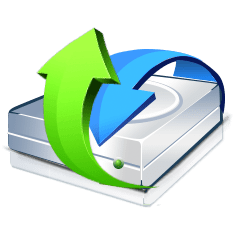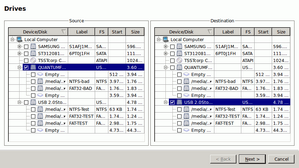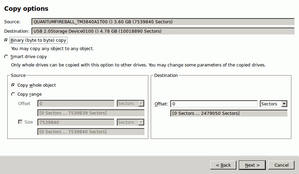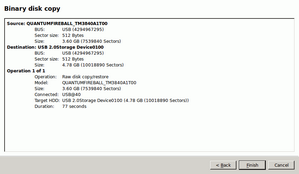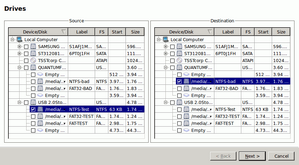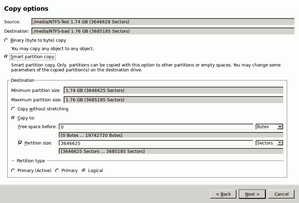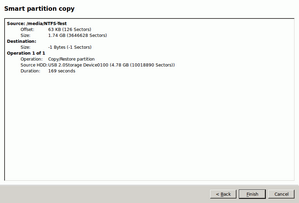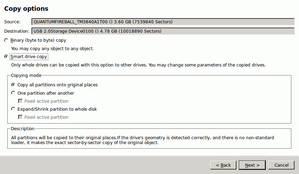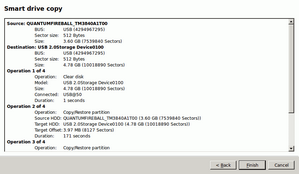- Contents
- Index
- A -
Apple CoreStorage/FileVault/Fusion Drive Volumes
- B -
Bad Sectors settings
Set default read retries count for all drives
Binary (byte to byte copy)
BitLocker System Drive Encryption
Broken File Name
Rename and change all invalid symbols to:
Broken File Name options
Button
Buttons
Create virtual volume sets or RAIDs
- C -
Connect to R-Studio settings
Contact information and technical support
Find Previous Versions of the File
Find Template Signature Previous
Remove All Scanned Information
Contextt menu
Create menu
Creating and saving your own RAID configuration
Creating Startup Disks for Mac and Linux Computers
- D -
Data Copy in Text/hexadecimal editor
Data Recovery on HFS/HFS+ File System
Description Files for Various RAID Configurations
Devices to Store Recovered Files
Dialog box
Dialog boxes
Edit Block RAID Layout Presets
Please configure R-Studio Agent for Mac
Please configure R-Studio Agent for Windows
R-Studio Agent for Linux Configuration
There is not enough space on the disk
Drive menu
- E -
Edit menu
Find Template Signature Previous
Editor tabs
Exclusive Region options
- F -
Fast Search for Lost Partitions
File Already Exists
File Information (R-Studio Technician/T80+)
File mask options
File menu
File Systems settings
Default encoding for Ext2/Ext3/Ext4/UFS volumes
Default encoding for HFS volumes
File Type Signature Specification
File Types
Find options
Find/Mark options
Find/mark objects only in real paths, ignore links to folders
Finding Previous File Versions
Forensic Data Collection Audit Log
- H -
Hidden Attribute
- I -
Image options
Image type:
Byte to byte image to a physical disk
Compressed image (R-Drive Image compatible)
VMDK (VmWare Virtual Machine Disk)
- K -
Known File Types settings
- L -
Log settings
Maximum messages in the Event Log
- M -
Main settings
Reset all hidden notifications
Messages
Double-click a logical disk...
- N -
Nested and Non-Standard RAID Levels
- O -
Opening several disks/partitions in one tab
Opening Virtual Disks from the Files Panel
- P -
Panels
Panes
Properties tab
- Q -
- R -
Recover options
Condense successful restoration events:
Open local folder (folders) when done
Recover alternative data streams:
Recover real folders structure
Region options
Contact information and technical support
Installing R-Studio Agent Emergency Startup Media Creator
Starting a Computer with the R-Studio Agent Emergency Startup Disk
R-Studio Agent for Mac main panel
R-Studio Agent for Windows main panel
Contact Informaiton and Technical Support
Installing R-Studio Emergency Startup Media Creator
Properties and Text/Hexadecimal Viewer
Starting a Computer with the R-Studio Emergency Startup Disks
R-Studio Emergency Startup Media Creator
- S -
Scan options
Search options
Settings
Shortcut menu
Smart drive copy
Copy all partitions onto original places
Expand/Shrink partition to whole disk
Smart partition copy
Startup Media Troubleshooting Options
Symbolic Links
Don't show symbolic links by default (Technician version)
Recovery as it is (Technician version)
Show folder symbolic links as links to their targets, without target content (Technician version)
Symbolic links display settings
Symbolic links recovery options
Syntaxis of a Description File for RAID Configurations
- T -
Tabs
Technical Information and Troubleshooting
Tools menu
- U -
- V -
Various Disk and Volume Managers
View menu
Volume Sets, Stripe Sets, and Mirrors
- W -
Window
Working with RAID 6 Presets
Drive Copy Wizard
You may copy any object in the Drives panel to any other object, if there is enough space on the target one.
Before Copy object to... becomes enabled on the Create menu, you need to enable writing.
To enable writing,
| 1 | On the R‑Studio for Linux main panel, select the Tools menu, then Settings , and select Enable Write on the Settings dialog box. |
| > | The Copy object to... will be enabled on the Create menu. |
Now objects can be copied.
While the objects are being copied, you may change some parameters and view the I/O monitor on the Object Copy Progress dialog box.
Depending on the objects to copy and your tasks, you may do:
Binary (byte to byte copy)
An exact copy of the source object (or a part thereof) to the destination device (from its beginning or a specified offset). Any object may be copied to any object this way.
To perform a binary copy of an object,
| 1 | Select Copy object to... on the Create menu |
| 2 | Select a source and destination objects on the Drives Copy Wizard panel and click the Next button |
| 3 | Select Binary (byte to byte) copy on the Copy Options dialog box, specify copy options, and click the Next button |
 Copy options
Copy options
|
Source |
|
|
Copy whole object |
Select this option if you want to copy the entire source object to the destination one |
|
Copy range |
Select this option if you want to copy a part of the source object |
|
Offset |
Specify the offset from which the source object data will be copied to the destination object |
|
Size |
Specify the size of the source object data which will be copied to the destination object |
|
Destination |
|
|
Offset |
Specify the offset on the destination object to which the source object data will be copied |
| 3 | View the copy task settings on the Drives Copy Wizard and click the Finish button |
or click the <Back button to edit the copy parameters
| > | R‑Studio for Linux will start copying data from the source object to the destination one. |
Smart partition copy
Only partitions can be copied with this option to other partitions or empty spaces. You may change some parameters of the the copied partition(s) on the destination drive.
To perform a smart partition copy of a partition,
| 1 | Select Copy object to... on the Create menu |
| 2 | Select source and destination partitions on the Drives Copy Wizard panel and click the Next button |
| 3 | Select Smart partition copy on the Copy Options panel, specify copy options, and click the Next button |
 Copy options
Copy options
|
Destination |
|
|
Copy without stretching |
Select this option if you want to copy the partition exactly to the destination place |
|
Copy to: |
Select this option if you want to change some parameters of the copied partition on the destination place |
|
Free space before |
Specify how much space will be left empty before the start of the copied partition |
|
Partition size |
Select this option and specify the new size of the copied partition |
|
Partition type Primary (Active)/ Primary/Logical |
Specify the type of the partition to be copied. Do not change this setting unless you have serious reasons to do so. |
| 3 | View the copy task settings on the Drives Copy Wizard and click the Finish button |
or click the <Back button to edit the copy parameters
| > | R‑Studio for Linux will start copying data from the source partition to the destination place. |
Smart drive copy
Only whole drives can be copied with this option to other drives. You may change some parameters of the copied drives.
To perform a smart drive copy of a hard drive,
| 1 | Select Copy object to... on the Create menu |
| 2 | Select a source and destination hard drives on the Drives Copy Wizard panel and click the Next button |
| 3 | Select Smart drive copy on the Copy Options panel, specify copy options, and click the Next button |
 Copy options
Copy options
|
Copying mode |
|
|
Copy all partitions onto original places |
Select this option if you want to copy all partitions to their original places. |
|
One partition after another |
Select this option if you want to copy the partitions one after another preserving their space. If there is empty space between the partitions, it will be omitted. Otherwise it is similar to Copy all partitions onto original places . If Fixed active partition is selected, the original offset/size of the active partition will be preserved (in case the loader has links to it). |
|
Expand/Shrink partition to whole disk |
Specify this option if you want to proportionally expand/shrink the selected partitions to occupy the entire target drive. If Fixed active partition is selected, the original offset/size of the active partition will be preserved (in case the loader has links to it). |
| 3 | View the copy task settings on the Drives Copy Wizard and click the Finish button |
or click the <Back button to edit the copy parameters
| > | R‑Studio for Linux will start copying data from the source hard drive to the destination one. |
- R-Studio Technician: activation using a USB stick
- Data Recovery Guide
- Why R-Studio?
- R-Studio for Forensic and Data Recovery Business
- R-STUDIO Review on TopTenReviews
- File Recovery Specifics for SSD devices
- How to recover data from NVMe devices
- Predicting Success of Common Data Recovery Cases
- Recovery of Overwritten Data
- Emergency File Recovery Using R-Studio Emergency
- RAID Recovery Presentation
- R-Studio: Data recovery from a non-functional computer
- File Recovery from a Computer that Won't Boot
- Clone Disks Before File Recovery
- HD Video Recovery from SD cards
- File Recovery from an Unbootable Mac Computer
- The best way to recover files from a Mac system disk
- Data Recovery from an Encrypted Linux Disk after a System Crash
- Data Recovery from Apple Disk Images (.DMG files)
- File Recovery after Re-installing Windows
- R-Studio: Data Recovery over Network
- How To Use R-Studio Corporate Package
- Data Recovery from a Re-Formatted NTFS Disk
- Data Recovery from an ReFS disk
- Data Recovery from a Re-Formatted exFAT/FAT Disk
- Data Recovery from an Erased HFS Disk
- Data Recovery from an Erased APFS Disk
- Data Recovery from a Re-Formatted Ext2/3/4FS Disk
- Data Recovery from an XFS Disk
- Data Recovery from a Simple NAS
- How to connect virtual RAID and LVM/LDM volumes to the operating system
- Specifics of File Recovery After a Quick Format
- Data Recovery After Partition Manager Crash
- File Recovery vs. File Repair
- Data Recovery from Virtual Machines
- How to Recover Files from a Remote Computer Using R-Studio Standalone License and Its Network Capabilities in Demo Mode
- How to Connect Disks to a Computer
- Emergency Data Recovery over Network
- Data Recovery over the Internet
- Creating a Custom Known File Type for R-Studio
- Finding RAID parameters
- Recovering Partitions on a Damaged Disk
- NAT and Firewall Traversal for Remote Data Recovery
- Data Recovery from an External Disk with a Damaged File System
- File Recovery Basics
- Default Parameters of Software Stripe Sets (RAID 0) in Mac OS X
- Data Recovery from Virtual Hard Disk (VHD/VHDX) Files
- Data Recovery from Various File Container Formats and Encrypted Disks
- Automatic RAID Parameter Detection
- IntelligentScan Data Recovery Technology
- Multi-pass imaging in R-Studio
- Runtime Imaging in R-Studio
- Linear Imaging vs Runtime Imaging vs Multi-Pass Imaging
- USB Stabilizer Tech for unstable USB devices
- Joint work of R-Studio and PC-3000 UDMA hardware
- Joint work of R-Studio and HDDSuperClone
- R-Studio T80+ - A Professional Data Recovery and Forensic Solution for Small Business and Individuals Just for 1 USD/day
- Backup Articles
- R-Drive Image Standalone and Corporate license transferring
- Fixing Windows update error 0x80070643 with R-Drive Image
- Backup with Confidence
- R-Drive Image as a free powerful partition manager
- Computer Recovery and System Restore
- Disk Cloning and Mass System Deployment
- Accessing Individual Files or Folders on a Backed Up Disk Image
- R-Drive Image startup / bootable version
- File Backup for Personal Computers and Laptops of Home and Self-Employed Users
- Creating a Data Consistent, Space Efficient Data Backup Plan for a Small Business Server
- How to Move the Already Installed Windows from an Old HDD to a New SSD Device and Create a Hybrid Data Storage System
- How to Move an Installed Windows to a Larger Disk
- How to Move a BitLocker-Encrypted System Disk to a New Storage Device
- How to backup and restore disks on Linux and Mac computers using R-Drive Image
- R-Drive Image and Virtual Machines
- Undelete Articles
- Get Deleted Files Back
- Free Recovery from SD and Memory cards
- R-Undelete: Video Recovery
- Recovery from an External Device with a Damaged File System
- File recovery from a non-functional computer
- Free File Recovery from an Android Phone Memory Card
- Free Photo and Video File Recovery Tutorial
- Easy file recovery in three steps

